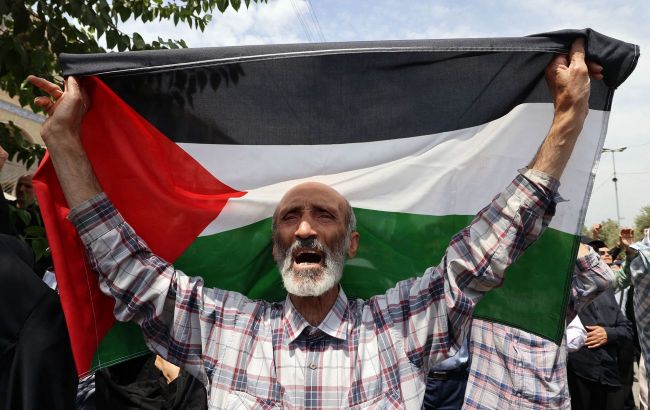Diplomatic shift: Why the West suddenly talking about recognizing Palestine
 A man with a Palestinian flag (Photo: Getty Images)
A man with a Palestinian flag (Photo: Getty Images)
France, the United Kingdom, and several other Western countries want to recognize the State of Palestine.
RBC-Ukraine explains what Palestine is and why not everyone in the world considers it a fully independent state.
Recently, many Western countries have announced their intention to recognize Palestine as an independent state. France and the United Kingdom are leading this initiative, and more than a dozen other countries, including Australia, Canada, Ireland, and Spain, have already expressed their support. They plan to take this step if Israel does not put an end to the "horrific situation" in the Gaza Strip, where a military operation against Hamas terrorists is ongoing. Therefore, it's worth recalling what exactly Palestine is and why its status remains so unique.
How the Palestinian National Authority came to be
In 1947, according to UN Resolution 181, there were plans to establish two states in the Middle East — Israel and Palestine. However, after a series of armed conflicts between Israel and its neighboring Arab countries, the Jewish state was eventually created, while Palestinian groups were left without territory and launched a campaign of terrorist attacks against Israel.
In the early 1990s, a reconciliation process began between Israelis and Palestinians. As a result, the Palestinian National Authority (PNA), was formed. This came after 1993, when Israel and the Palestine Liberation Organization (PLO) signed the Oslo Accords.
Under the "land for peace" formula, the PLO recognized the State of Israel and renounced the use of terrorism. In return, Israel granted the PLO administrative control over parts of the West Bank and the Gaza Strip.
The Palestinian National Authority was established in these areas as a temporary governing body intended to manage the territories until a final peace agreement could be reached with Israel.
Features of the Palestinian National Authority
The PNA is still not a fully independent state, as Israel maintains control over its borders, airspace, water resources, and also collects taxes on behalf of the Palestinian administration. Additionally, the PNA remains heavily dependent on international aid.
The creation of a Palestinian state in the West Bank and Gaza was originally envisioned to occur within five years. However, this never happened. In 2000, the parties failed to reach a final agreement due to key disagreements over borders, the status of Jerusalem (which both Israel and the PNA claim as their capital), the right of return for Palestinian refugees, and security guarantees for Israel.
At the same time, both in Israel and among Palestinians, there were many political opponents of the Oslo Accords. In 2000, the so-called Al-Aqsa Intifada broke out — a low-intensity conflict marked by Palestinian terrorist attacks and riots, followed by harsh military responses from Israel. As a result, the Palestinian state-building process was effectively put on hold.
Territories the Palestinian National Authority controls
Currently, the PNA controls only parts of the West Bank — specifically, areas known as Zones A and B, as defined by the Oslo Accords. Zone A is under full civil and security control of the PNA. Zone B is under the PNA's civil control, but Israel retains security control there. There is also Zone C — about 60% of the West Bank — which remains under full Israeli control.
A particularly contentious issue remains the ongoing expansion of Israeli settlements in these territories, which many Palestinians view as creeping colonization.
The PNA has also lost control over the Gaza Strip. In 2005, Israel fully withdrew its military forces from the enclave. The following year, in the PNA parliamentary elections, the Hamas movement won a decisive victory over the Fatah party, which had previously dominated Palestinian politics. This eventually led to a civil war between Palestinian factions. As a result, Hamas took over the Gaza Strip, while Fatah retained control over the West Bank.
International recognition
Despite the complexities on the ground, more than 140 countries worldwide — including Ukraine — have recognized Palestine as a state. In addition, in 2012, the UN General Assembly granted Palestine observer status, and in 2024, Palestine's rights at the UN were further expanded. The PNA is also a member of several international organizations.
Israel opposes unilateral recognition of Palestine, viewing it as a threat to the peace process. Until recently, countries like the United Kingdom, France, Germany, Japan, and Australia had also refrained from recognizing Palestine as a state, insisting that statehood must be achieved through direct negotiations with Israel.
However, the positions of some of these countries have shifted due to the worsening humanitarian situation in the Gaza Strip, where Israel is conducting a military operation against Hamas. The recognition of Palestine is now seen as a way to draw international attention to the crisis and to increase pressure on Israel to cease hostilities.
Additionally, the issue of Palestine carries weight in the domestic politics of these countries. For example, in France, support for Palestinians is growing among left-leaning groups and Arab migrants, putting pressure on President Macron's government. In the UK, recognizing Palestine was part of the Labour Party's campaign platform — the party now holds power.
While these recent diplomatic moves may not lead to immediate changes on the ground in Palestine, they could weaken Israel's political standing on the international stage. Nonetheless, the United States continues to stand firmly with Israel. US Secretary of State Marco Rubio rejected France's plan, calling it a "reckless decision" that only fuels Hamas propaganda and undermines efforts to achieve peace.
Sources: statements by European, Israeli, and American officials, as well as BBC, Le Figaro, and The Times of Israel.

